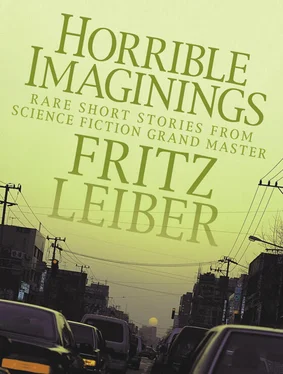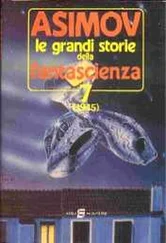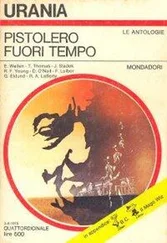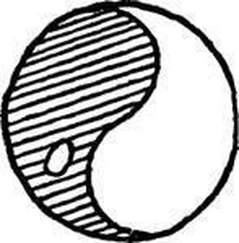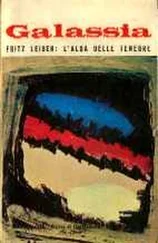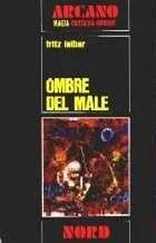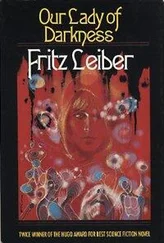“That’s strange,” said Wolf, “because the only other one of his pictures I seem to remember now from those days—I think now that it had some influence on my life, my choice of profession—was one of a leopard.”
Cassius’ sudden laugh was excited. “You know, Wolf,” he said, “I believe I’ve got that very picture up in the attic! Along with some other stuff Esteban asked me if he could store there. He was going to send for them or come back for them but he never did. In fact it was the last time I ever saw him, or heard from him for that matter. It’s not a good picture, he never could sell it, the anatomy’s all wrong and somehow a lot of green got into it that shouldn’t have. I’ll take you up and show it to you, Wolf, if you’d like. But tomorrow. It’s too late tonight.”
‘That’s right,” Terri echoed somewhat eagerly. “Time for bed, Tommy. Time for bed long ago.”
And later, when she and Wolf were alone in their bedroom, she confided in him, “You know, your father gave me a turn tonight. It was when he was talking about those dry flakes of green paint vibrating in the air in the shape of a face. He dwelt on them so! I think imagining them brought on his coughing fit.”
“It could have,” Wolf agreed thoughtfully.
The third-floor attic was as long as the house. Its front window seemed too high above the descending hillside, its rear one too close to it, shutting off the morning sunlight. Cassius piloted Wolf through the debris of an academic lifetime to where a half dozen canvases, some of them wrapped in brown paper, were stacked against the wall behind a kitchen chair on which rested a dust-filmed chunky black cylindrical object about the size and shape of a sealed-in electric generator.
“What’s that?” Wolf asked.
“One of Esteban’s crazy inventions,” his father answered offhandedly, as he tipped the canvases forward one by one and peered down between them, hunting for the leopard painting, “some sort of ultrasonic generator that was supposed to pulverize crushed ore or, no, maybe agitate it when it was suspended in water and get the heavier gold flakes out that way, a mechanical catalyst for panning or placering, yes, that was it!” He paused in his peering search to look up at Wolf. “Esteban was much impressed by a wild claim of the aged Tesla (you know, Edison’s rival, the inventor of alternating current) that he could build a small, portable device that could shake buildings to pieces, maybe set off local earthquakes, by sympathetic vibrations. That ultrasonic generator there, or whatever he called it, was Esteban’s attempt in the same general direction, though with more modest aims—which is a sort of wonder in itself considering Esteban’s temperament. Of course it never worked; none of Esteban’s great inventions did.” He shrugged.
“He fixed my robot,” Wolf mused. Then, somewhat incredulously, his voice rising, “You mean he left it here with you, and the other stuff, and actually never came back for it, even wrote? And you didn’t do anything about it either, write him at least?”
Cassius shrugged more broadly. “He was that sort of person. As for me, I think I tried to write him once or twice, but the letters came back. Or weren’t answered.” He smiled unhappily and said softly, “Alcohol’s a great forgettery, you know, a great eraser, or at least blurrer, softener….” With a small gesture he indicated the shelves of books, the piled boxes of old files and papers between them and the ladder to the second floor. “Alcohol’s washed through everything up here—the university, Helen, Esteban, all my past—and greyed it all. That’s alcohol dust on the books.” He chuckled and his voice briskened. “And now to things of today. Here’s the picture I promised you.”
He straightened himself, drew a canvas on which he’d been keeping his hand out of the stack with a flourish, wiped it off on his sleeve, and faced it to Wolf.
It was a medium-size oil painting, wider than high, of a golden leopard with black spots like tiny footprints, stretched out on a branch in a sea, a flood, of green leaves. You knew it was high in the tree because the branch was thin and the green sunlight the leaves transmitted was bright, so all-suffusingly bright that it gave a greenish cast to the leopard’s sleek fur, Cassius had been right about that. And also about the bad anatomy too, for Wolf at once noted errors of muscle placement and underlying bony structure.
But the face! Or muzzle or mask, rather, that was as magnificent as memory had kept it for him, a wonderfully savage sensitive visage, watchful and wild, the quintessence of the feline….
Cassius was saying, “You can see he’s even got the eyes wrong, giving them circular pupils instead of slits.”
“In that one point he happens to be right,” Wolf said, happy to get in a word for the man who, he was beginning to remember, had been something of a childhood hero to him. “The leopard does not have slit eyes like a house cat, but pupils exactly like ours. It’s that detail which gives him a human look.”
“Ah so,” Cassius conceded. “I didn’t know that. Live and learn. He should have painted just that, used the mask trick he did with his pictures of people.”
Wolf’s gaze and mind returned to the black object. He looked it over more closely without handling it, except to brush off dust here and there. “How the devil was it supposed to be powered? I can’t see any place for plugging in wires, just the one switch on top, which indicates it was run by electricity.”
“Batteries, I think he told me,” the old man said, and, bolder or less cautious than his son, reached over and pushed the switch.
It was, at first, to Wolf holding it, as if a very distant unsuspected ponderous beast had roused and begun to tramp toward them across unimagined miles or light years. Under his hands the black cylinder shook a little, then began to vibrate faster and faster, while in his ears a faint buzzing became a humming and then a higher and higher pitched whine.
The unexpectedness of it paralyzed Wolf for a moment, yet it was he rather than his father who thrust back the switch and turned off the thing.
Cassius was looking at it in mild surprise and with what seemed to be a shade of reproach. “Well, fancy that!” he said lightly. “Esteban returning to us through his works. I never dreamed—This seems to be my morning for misjudging things.”
“Batteries that last twenty or more years—?” Wolf uttered incredulously and then didn’t know how to go on.
His father shrugged, which was not the answer Wolf was looking for, and said, “Look, I’m going to take this picture downstairs. I agree it has possibilities. Could you carry that… er… thing? I know it’s too heavy for me, but perhaps we should have a look at it later. Or something…” he trailed off vaguely.
Wolf nodded curtly, thinking, Yes, and shut it away safely where neither Tommy nor anyone else can get their eager little unthinking hands on it. He found himself strangely annoyed by his father’s irresponsibility, or over-casualness, or whatever it was. Up to now the old man had seemed to him such a normal sort of reformed or arrested alcoholic. But now—? He hefted the black cylinder. It was heavy.
He found himself wondering, as he followed the slow-moving Cassius to the front of the attic, what other time bombs there might be, in the old man’s mind as well as the house, waiting to be detonated.
But his thoughts were somewhat diverted when he glanced out the front attic window. A short way down the hillside and to the side of the house amongst the nearest trees and further fenced by tall shrubs was a grassy bower that was bathed in sunlight and into which he could look down from his vantage point. Sprawled supine at its center on a long black beach towel was Loni clad in black wraparound sunglasses, a quite splendid sight which somehow reminded Wolf of a certain wariness Terri had had of her then thirteen-year-old sister during their courtship and also reminded him perhaps to tell the girl a cautionary tale or two about the Trailside Murderer who had terrified Marin County some years back.
Читать дальше
